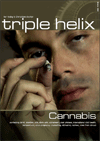Cannabis is a controversial subject. According to a UK Government advisory body,'cannabis does not pose a serious problem for previously healthy people'.[1] Yet the head of the United Nations Office on Drugs and Crime believes that 'cannabis [is] as bad as heroin'. [2]
Acting on a 2002 recommendation of the Advisory Council on the Misuse of Drugs, [3] cannabis was reclassified (along with amphetamines and barbiturates) in 2004 from Class B to Class C (joining benzodiazepines and anabolic steroids). Despite this reclassification, the maximum penalty for cannabis possession is two years in prison; for supply or intent to supply, the sentence is much stiffer, 14 years plus a fine. [4]
So what is the truth about cannabis?
Action and Effects
The plant cannabis sativa contains up to 400 chemicals and 67 compounds, the strongest psychoactive component being 9-delta tetra-hydrocannabinol (THC). It is thought that cannabis' effects are mediated by THC on cannabinoid receptors (CB1, 2 and 3) in the brain, affecting the amount of dopamine released. This would explain why it is associated with schizophrenic symptoms in some people. It also appears to fit the dopamine hypothesis of schizophrenia, whereby it is postulated that schizophrenic symptoms are produced by an excess of dopamine, especially in the neocortex and limbic system.
Acute cannabis intoxication can lead to acute transient psychotic episodes. Genetic studies may well explain why certain individuals are thus affected: those with the Val/Val variant of the dopamine-regulating catechol-O-methyl transferase (COMT) gene are more susceptible to cannabisinduced psychosis. [5] Cannabis also leads to an exacerbation or recurrence of psychosis in those with pre-existing psychosis. [6,7] In experiments, both positive (for example, delusions) and negative (for example, apathy) symptoms of schizophrenia have been found in healthy human subjects after intravenous administration of cannabis. [8] Cognitive effects also occur: after road traffic accidents, elevated blood levels of cannabis have been detected in injured drivers, even in the absence of alcohol or other drugs. [9]
Longer term effects
These are all short term effects but, in vulnerable people, it seems likely that permanent changes occur after repeated cannabis exposure. There are still methodological problems in stating a causal link between cannabis and psychosis. Firstly, there is the problem of the possible presence of confounding factors such as previous psychosis. And secondly, there is the issue of reverse causality – couldn't psychotic patients just be self-medicating, using cannabis to treat their psychoses? However, studies – both longitudinal and cross-sectional – have now controlled for these factors. One review article concluded: 'These studies produce…suggestive evidence that supports the conclusion that the link between the use of cannabis and increased risks of psychosis is likely to be causal'. [10] This is particularly the case in young people where early exposure to cannabis increases the risk of psychosis in later life. It has been calculated that the attributable risk of psychosis from cannabis is eight percent – in other words, if cannabis was eliminated in 15 year olds then the rate of psychosis would fall by eight percent. [11] The same authors later encouraged 'policy and law makers to concentrate their effort on delaying the onset of cannabis use'. [12]
Dependence, both psychological and chemical, occurs in about seven to ten percent of users; early onset of use, especially on a daily or weekly basis, is a strong predictor of future dependence. [13] Furthermore, some studies show a weaker but still significant link between cannabis and depression. [14] There is no conclusive evidence as to whether chronic cannabis use has any long-term cognitive effects in adults; however, there is some evidence that memory, executive functioning and information processing are apparently permanently affected in the offspring of women who used cannabis in pregnancy. [15] Latest research in animals suggests that early exposure to cannabis can lead to greater vulnerability to later heroin addiction. [16]
What should we think?
We should be more cautious than before. In 2000 the Police Foundation said that cannabis was less harmful than alcohol or tobacco. [17] In 2002 the Advisory Committee on the Misuse of Drugs [18] stated that:
- there were no serious problems for previously healthy people;
- there were some risks to health but these were less than for amphetamine;
- even occasional use posed significant dangers for people with mental health problems including schizophrenia, and for those with poor circulation or heart problems.
On the basis of this evidence, the Government reclassified cannabis to a Class C drug but the UK Drugs Czar Keith Hellawell resigned over this move: 'It is giving the wrong messages to parents and children'. [19] The Head of the United Nations Office on Drugs and Crime, Antonio Maria Costa, was also critical of the reclassification, saying that it was a mistake to dismiss cannabis as a soft drug; that it was considerably more potent than a few decades ago and that cannabis dependence was a reality. [20]
Especially for young people, cannabis should not be viewed as a soft drug.We should take a personal and public health stance and warn patients, our fellow health professionals, carers, teachers, school students and MPs. The evidence shows that, in vulnerable young people, cannabis is associated with later psychotic illness.
Further reading
Royal College of Psychiatrists - www.rcpsych.ac.uk
































